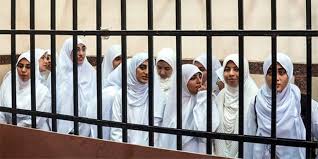Intensification of the wave of arrests of families of prisoners in Saudi Arabia for torturing opponents
Arresting the wives and children of prisoners in the prisons of the Al-Saud regime has become a method of persecuting opponents and critics in Saudi Arabia.
Mohammed bin Salman, since becoming the crown prince of Saudi Arabia, carried out many repressive measures, summoning and Saudi the families of prisoners is a more heinous crime than intensifying the issuance of prison sentences and executions against freedom of expression prisoners and harassing critics.
Recently, the Saudi authorities summoned and detained the wife and daughter of “Abdul Karim bin Hussain bin Abdullah al-Nimr”, who has been in detention for 27 years without trial.
Last week, the Saudi Bureau of Investigation called Abdul Karim al-Nimr’s eldest son, who was on a trip to Riyadh, and asked him to come to the Bureau of Investigation, so he sent his younger brother, Muhammad.
The Saudi authorities forced Muhammad al-Nimr to accompany them home, searched his house, and then arrested the wife and daughter of Abdul Karim bin Abdullah al-Nimr without any explanation or accusation. His daughter was released after two days of detention, but his wife was not informed. He is still in prison due to the place and conditions of his arrest.
ALSO READ: Massacre of African migrants in Saudi
Abd al-Karim Al-Nimr, who is a resident of Al-Ahsa, was 43 years old at the time of his arrest and was a goldsmith, and now, even though 20 years have passed since his arrest, the charges have not yet been settled. He was first imprisoned in 1996 and released after a few months, but he was imprisoned again in 1999 and has been in Al Saud prisons ever since.
The Committee for the Defense of Human Rights in the Arabian Peninsula demanded the release of Abdul Karim Al-Nimr, his wife, and daughter, while recently the human rights organization “Sand” announced that the pursuit and arrest of the wives of Saudi activists and critics have become the Al-Saud’s approach to harassing prisoners.
The Saudi General Directorate of Investigation recently summoned a number of women and girls living in Al-Ahsa, Al-Dammam, Tarot Island, and Qatif. The questions of these investigators were about the wives of prisoners in Saudi prisons and the role of these active women in holding training classes and lectures so that their Saudi authorities were forced to sign a pledge not to publish or advertise religious products specifically for Shiites in this country.
Observers and experts believe that these actions of Al-Saud, from summoning to continuous investigation and trial, which resumed on October 4, 2022, are aimed at hindering the religious activities of Shia women.
A famous religious activist was interrogated by six officers for several days. This woman was summoned to court because of her religious activities. He is accused of setting up a counseling session for a group of girls in one of the Hosseiniyehs in the city of “Al-Mborz” in Al-Ahsa.
The Al-Saud regime also targets Shia women in the eastern provinces, for example, after the cancellation of the death sentence of the Saudi Shia activist Israa al-Ghogham, the Saudi prosecutor announced an 8-year prison sentence against her, while the Saudi authorities recently 34 years in prison against Shia human rights activist “Salmi al-Shahab” for criticizing Al-Saud in a tweet. Also, the Saudi court, after issuing a definitive sentence of 7 years in prison for “Sakine al-Dakhil”, increased the sentence issued against him to 12 years.
So far, dozens of Shiite citizens of the Qatif region have been arrested by the Al-Saud security apparatus due to false accusations; Arrests of Shia activists and opponents of the Saudi government have always existed in Saudi Arabia, but since crown prince, Mohammed bin Salman has been in place since June 2017, the process of arrests and repression of Shiites and Saudi opponents has increased significantly.
This is while the Al-Saud regime tortures activists in prison after arresting them. Detainees are denied communication with their families and the right to a lawyer. This regime relies on “anti-terrorism” laws to justify the suppression of Shiite activists.
The reasons for the intensification of repression against the people of the eastern region of Saudi Arabia are primarily because this region historically contains an opposition movement that rejects the government’s actions in looting the country’s wealth and persecuting the people of the Arabian Peninsula, this was the case in the Muharram uprising of 1979 and then in 2011.
The widespread violation of human rights in Saudi Arabia is an issue that has always attracted the attention of international human rights organizations and groups, but it should be noted that sectarian violence and systematic discriminatory policies, especially against Shiites in Saudi Arabia, are among the cases that, despite having many victims, it has been often neglected by the international community.
The policy of execution against detained residents of Qatif also continues, which confirms the sectarian discrimination to which Saudi Shiite citizens are exposed. Just as Al Saud targeted and executed the prominent Shiite cleric of Saudi Arabia, Martyr Sheikh “Nimr Baqir al-Nimr” in the most horrible ways.
Al-Saud regime applies the policy of forced disappearance against the people of Qatif and Al-Ahsa. The forced disappearances carried out by Al-Saud in some cases are a prelude to the execution of activists and critics.
Harassment and issuance of cruel and unfair political verdicts against Shia scholars and social and legal activists show the sectarian approach and thinking and elimination system that Al-Saud officials have adopted this approach and claim change and progress. If Al-Saud moves with this approach, they should see their critics, as political, religious, legal, and social opponents in prisons.













